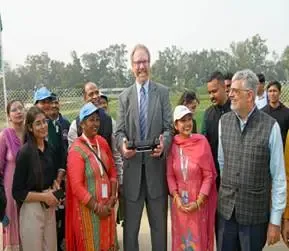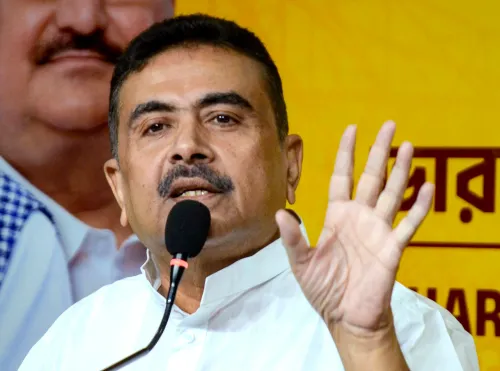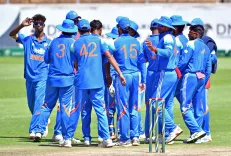MIT’s Jonathan Fleming Celebrates Namo Drone Didis and Women Empowerment in India

Synopsis
Key Takeaways
- India is using technology for women empowerment.
- Namo Drone Didis exemplify successful government initiatives.
- Drone technology aids in agricultural tasks, enhancing efficiency.
- Women beneficiaries are transforming their financial conditions.
- India is merging traditional knowledge with modern tech for agriculture.
New Delhi, March 1 (NationPress) India is harnessing technology for women empowerment, serving as a beacon of inspiration not only to rural women within the nation but also globally, as noted by Professor Jonathan Fleming, a senior lecturer at the Massachusetts Institute of Technology (MIT) Sloan School of Management, during his visit on Saturday.
During his engagement with the Namo Drone Didis at the ICAR Pusa campus in New Delhi, he commended the government's initiatives and the remarkable strides made in empowering women.
Professor Fleming expressed admiration for the training process and the substantial benefits the women receive from utilizing advanced technology in India.
The Drone Didis shared their experiences with the visiting professor, detailing the government's support in helping them adopt drone technology and offering financial aid to become certified Drone Didis.
In conversation with Professor Fleming, the Didis highlighted how drone usage has facilitated the spraying of fertilizers and pesticides in dense crops, where manual application has posed significant challenges.
They expressed pride in their identity as Drone Didis and noted considerable improvements in their financial situations.
Jonathan also toured the Drone Robotic and Machine Learning Centre of IRAI, where he observed various drone technologies developed by the institute and their impact on traditional farming practices through technological integration.
Dr. Ravi Sahoo, Principal Scientist, Division of Agricultural Physics at IRAI, provided an overview of India's drone journey, explaining how the country is merging indigenous knowledge with modern technology to transform the agriculture sector, which is vital to the Indian economy and social fabric.
Professor Jonathan found this technological advancement fascinating, stating that India is not only revolutionizing its current agricultural system but also making investments for the future.
He remarked that while 100 percent of drone incentive scheme beneficiaries in the US are men, in India, the scenario is entirely different as all beneficiaries are women, exemplifying how India leverages technology for women empowerment.










